- Home
- Michael Crichton
Scratch One Page 7
Scratch One Read online
Page 7
“Well, hell,” Carr said. “If I were a robber, I wouldn’t load my gun either. You just want to frighten people into paying up, not kill them.”
“Precisely.”
Precisely what? Carr wondered. He couldn’t see what Vascard was leading up to.
“How much money were you carrying with you at the time?”
“About forty, maybe fifty dollars.”
“And yet you chose to fight.”
“I tell you, it was instinctive. Reflexive. Automatic. I didn’t stop to think about it.”
“Why not?” Vascard asked, in a curious voice.
“I don’t know, I just didn’t, that’s all.” Carr angrily stubbed out his cigarette.
“If I had been in your place,” Vascard said quietly, “I would have been much more willing to fight if I had known—or suspected—that the gun was not loaded.”
There was a very long, dead silence.
“What are you getting at?” Carr said.
“I am merely trying to understand why a young American lawyer will risk his life rather than pay a robber fifty dollars. You underestimate your worth, perhaps.”
Carr couldn’t think of a good comeback, so he said nothing.
“You mentioned earlier,” Vascard said, “that you believed the men in the Citroën were shooting at you. Why is that?”
“My natural sense of self-importance, I guess. Probably the machine gun was a birthday present, and they wanted to try it out.”
Vascard’s thick hand reached into the light and stubbed out his cigarette. He lit another, and Carr found himself straining to catch a glimpse of the man’s face—some expression, some indication of emotion—in the match-light. “Sarcasm will get us nowhere. Do you want to spend all day here?”
Carr threw up his hands. “I don’t know why I thought they were shooting at me. I just assumed it.”
“You seem to be assuming a great deal today. You assumed you were being robbed, and you assumed you were being shot at. You’re a man very much in demand, aren’t you?”
“Look, if you’re accusing me of something, why don’t you come right out and say it?”
“All right,” Vascard said. “You’ve fired a machine gun. I’ve fired a machine gun. We both know perfectly well that if they had wanted to, those people could have added half a pound of pure lead to your bodyweight.”
“I’ve fired a machine gun?” Carr said. “Me?”
Vascard sucked on his cigarette and groaned inwardly. The man could obviously act, but he was so weak on his stories. He’d had more than an hour out there in the waiting room to come up with something good, and he hadn’t managed a thing. In the war, he thought grimly, this poor bastard wouldn’t have lasted ten minutes.
“All right,” he said patiently. “Let’s begin again: a man approaches you with a gun in broad daylight. You do not know him. Assume he is not going to rob you. What does he intend?”
“Maybe he was going to kill me.”
“With an unloaded gun?”
“I didn’t know that.”
“But he knew it quite well. Or perhaps he didn’t…” Vascard lapsed into a long silence. Carr shifted in his chair and lit a cigarette. Things were suddenly, hideously, impossibly complicated. Damn, he needed a drink badly.
“No.” The policeman’s voice broke the silence with its certainty. “No, murder was not intended here. Nor was robbery. The aftermath of this business is too bizarre for that Mr. Carr, did you ever think that this man wished to abduct you?”
Carr laughed. It was ridiculous. He had a vision of himself, flung like a bag of potatoes, over the shoulder of a scarred brute and hustled off to a mountain retreat. “Why should anyone want to do that?” he asked.
“That is my question.”
“I can’t imagine why.”
“Ransom perhaps? Something to do with your … client? Please consider carefully.”
“No. Sorry. It’s just impossible. My father has money, but he would like nothing better than for somebody to kidnap me. He’d pay them to keep me.”
“What about Victor Jenning?” Vascard said suddenly.
“What about him? I’ve never heard of him.”
“He’s actually quite well-known. Perhaps you’ve heard the name mentioned, at a party?”
“Never.”
Vascard sighed. “All right.” He stood up and opened the shades. Hot sunlight poured into the room; Carr squinted.
“I doubt,” Vascard said, “that we will gain anything further from our conversation.” He looked at Carr thoughtfully, a long, peculiar look. “But I would like to give you some advice, and I hope you’ll take it.”
“Yes?”
“Your position here is very difficult. You have been involved in an incident which you insist you know nothing about. The incident is serious. There may be repercussions, repetitions.”
Carr nodded.
“I can do only one thing for you, and that is look the other way. You people make it very hard for me, but I can arrange it this one time. Next time …” He shrugged.
“What are you saying?”
“I think we understand each other, Mr. Carr.”
“I don’t think we understand each other at all. I need protection. There’s been a murder, and the situation is pretty confused. You should be doing something for me. Otherwise I’m at the mercy of—”
“Mr. Carr. Your energy is a source of wonder to me. Please stop protesting. I am doing all I can for you, I swear it. Don’t ask more.”
“You’re trying to frighten me.”
“I doubt that you are easily frightened. Although I must say you are an excellent actor. I mean that in all seriousness. Superb.”
“Son-of-a-bitch,” Carr said. What kind of a lousy joke was this, anyhow? He got up and stomped out of the office.
In his office, Dr. Liseau picked up the phone and listened for several minutes. Then he said, “I don’t care to hear your explanations. You messed it up. There is nothing more to be said. How much time did he spend with the police? Really? I am surprised they kept him so long.”
He listened again, and reached into his desk drawer for a scalpel. He held it up and tilted it so it caught the light. The blade gleamed, in contrast to the dull metal of the handle.
“All right,” he said at last. “Try again. But I cannot wait forever.”
Liseau replaced the receiver and looked closely at his knife. It was a Hamilton Bell and Company scalpel, with a number-twenty-two blade of German steel—a rather large and clumsy blade, in the opinion of many. But Liseau disagreed. He liked an instrument with plenty of cutting edge.
Chapter VIII
ROGER CARR SAT IN a chair and looked at his hotel room. It was a large room, with a double bed and balcony looking out over the beach. It was decorated in the style of Louis XIV, with a large pink flower-print canopy over the bed, and the same fabric for drapes at the window. The chairs were covered in cloth of green and gold, and the gilded wooden arms were encrusted with leaves and curlicues. Altogether, it was a very feminine-looking room, he decided. He looked at the double bed as he lit a cigarette, and recalled how pleased he had been at the tactful way the hotel had given him a double bed without his asking. He was no longer pleased about anything. The police interview had unnerved him, and he badly needed a drink.
He picked up the white telephone beside the bed. “Room service, please.” Clicking while he was put through. “I want a dry vodka gimlet, and a chicken-salad sandwich. Room Three-o-four.”
He got up and paced tensely across the thick pea-green carpet for several minutes. There was a knock at the door. Awfully quick service, he thought. He opened the door, and to his surprise, a man slipped furtively into the room, giving the hallway a last check as he stepped inside. He was a small man, swarthy, with short bristly hair and a lewd grin. He had a two-day growth of beard, and what looked like gravy on the breast of his dark sweater. His hands were filthy, covered with grease and grime. Carr noticed it as the man
put his finger to his lips and shut the door.
“What—”
The man clamped one smelly hand over Carr’s mouth, shook his head, and took his hand away. Carr stared wide-eyed as the fellow glanced intently around the room and began rummaging about. He squinted at the ceiling lamp, looked under the bed and behind pictures. Then he lifted up the telephone, and beamed. He showed Carr the flat object taped to the bottom. Then he took out a knife and cut it away.
“What—”
The man shook his head insistently, and Carr quickly shut his mouth. The little man continued searching, but now Carr understood, and joined in. A second microphone was discovered over the molding of the closet door. The man yanked it free and threw it out the window. Then he gave a long sigh.
“At last. We can talk, eh?”
“Sit down,” Carr said, hesitantly. Who would want to bug his room?
“No. I will stand. You sit.” The man smiled. “You are surprised at the microphones?”
“Yes, frankly.”
The man shook his head wonderingly. “I agree. It is not like the old days. It used to take hours to find them. Now…” He snapped his fingers.
“What do you want?”
The man laughed. And then Carr remembered—the telephone conversation, and the appointment to meet at noon. He’d forgotten all about it, but obviously this man hadn’t.
“What do you want, my friend?” the little man asked.
“Don’t be silly. I don’t want anything.”
“There is no need,” said the man, airily waving his hand and lighting a cigarette, “to be cautious. I can deliver, I assure you. I have exactly what you want”
“Why is that?”
“You might say that there is a weak link in the chain, eh?” He laughed, right in Carr’s face. Garlic wafted toward him. “A link about to break—a link that wants to break, my friend. Now!” He stamped his foot down. “What do you say to that, eh? Are we in the business?”
“Listen, I think you’re making a mistake. I’m here to buy a villa, nothing else. I don’t know anything about—”
The man patted Carr’s shoulder agreeably. “Sure, sure. You think I want your life history? I trust you, my friend.”
Carr scratched his head and lit a cigarette.
“But let us waste no time, eh? I took a risk coming here. And it would be bad for both of us if I were found. Bad for all three of us.”
“All three?”
“Mais oui: the link, too.”
“Of course.” Carr had the disturbing feeling that he was no longer surprised at meaningless conversations. They were becoming an accepted part of his life.
“Alors! Down to business. How much do you pay?”
Carr shrugged.
“America is a rich country, my friend. For such important information, you should pay well. I have been thinking of, perhaps, five percent of the value of the shipment. What do you say? Agreed?”
“Perhaps.”
“It is cheap, at the price.”
“Maybe.”
“You want to think, and talk to your friends, eh? I understand. The information is not exactly free.” He laughed and slapped Carr heartily on the back. “But just imagine! To know everything, from the inside, the entire plot. Incroyable, eh?”
He stepped back and smiled, as if he had just performed a magic trick.
“And you want some proof I can deliver, so I tell you a few things. Bon. But I cannot say much, or you will guess all. Only that there are five in it, and the plan is a master—they will get him, unless you act. There is no time, so we will meet tomorrow, eh? Here.” He pulled a small gold ring off his little finger and handed it to Carr. “Tomorrow, at noon, in the toilette publique on the beach. You know it? Near the American Express. Wear this, and a man will contact you. Perhaps me, perhaps another, eh?”
Carr looked doubtfully at the ring.
“Remember the price,” the man said, moving toward the door. “Five percent, no less. There can be no bargains over the price.”
And with that, he was gone. Carr was left with a ring in the palm of his hand, a small gold circle, leading him nowhere.
Chapter IX
PIERRE MORNEAU HAD BUT one dream, and that was to become a chef. True, at his present job, he did no cooking; but he was young, at sixteen, and even as a waiter he was learning.
He stepped into the elevator with the tray ordered by Room 304. That was the American, the one who usually ordered only drinks. This was little better: a chicken-salad sandwich and a gimlet. Pierre wrinkled his nose at the thought. It was hopeless, Americans had no taste.
Since he was alone in the elevator, he followed his usual custom, which was to sample a bit of the food going upstairs. He did it out of curiosity, and a certain feeling of spite—the chef who handled room-service orders was old, and falling off the mark by a good bit. Pierre could tell, and he felt somehow renewed and hopeful whenever he tasted one of the old man’s dishes that was not quite right—or downright bad.
He lifted the heavy silver cover and looked at the sandwich. A barbaric invention, the sandwich. Carefully he drew out a bit of chicken on a small leaf of lettuce and popped it into his mouth. He replaced the silver cover while he chewed; you never knew when the elevator would stop and someone get on.
His opinion of the old man was confirmed once again. The chicken tasted very strange indeed. Salty, a little tart. No, it wasn’t salt—something else, something similar. What could it be?
As he wondered, he felt a wave of dizziness, and his knees buckled. The platter clattered down, and the sandwich fell open onto his shirt. But Pierre did not notice; he was unconscious.
Twenty minutes after the little man had gone, there was a knock at the door. Carr, who had been debating whether to call the desk about his sandwich and drink, opened the door, saying, “Well, it’s about time—”
He stopped. Instead of a waiter, two men in business suits were standing before him. They seemed as startled as he, and for a long moment nobody said anything.
“Can I help you?” Carr asked finally.
“I think,” said one man hesitantly, “that we have the wrong room. You are not Monsieur Raymond?”
“No, sorry.”
“Pardon us, monsieur.”
The men left. Carr went directly to the phone, called room service, and bitched about the fact that he still hadn’t received his chicken sandwich and, more to the point, his drink. The man at the other end made clucking, soothing noises. It seemed there had been an accident; one of the waiters had taken ill while delivering the order. In the confusion, there had been some delay…
While he was on the phone, there was another knock on the door. This time it was a liveried man with a silver tray on which lay a telegram. He took it back to the phone.
The man on the phone was upset at the delay, he wanted Mr. Carr to know. The order was on its way, and he hoped that Mr. Carr would accept the drink with the compliments of the hotel. Carr said he would, and hung up happy. He tore open the telegram. It was from New York.
FRIENDS REPORT VILLA PERRANI FOR SALE AGENT K D GRAFF STOP BUY IT UP TO HALF-MILLION TRY FOR 400 STOP KISS ONE FOR ME GOOD LUCK
SONNY
So the governor had found a villa by himself. That was a development. He checked his watch, and discovered for the hundredth time that it read 2:46. He would have to get it fixed in the morning. Looking out the window, however, he saw that the sun was dropping; it was probably too late to call Graff and make inquiries. He would see the man tomorrow.
The sandwich and drink came, and he found he badly needed both. When he had finished, he went into the bathroom to shower before dinner.
Liseau tried to suppress his annoyance with Brauer. The German had fumbled again; obviously, he was not a trained kidnapper. But the idea of drugging the American and taking him from the Negresco was absurd—worse than daring, it was foolhardy. It was a stroke of purest luck that it hadn’t worked; they would all surely have been caught.
But now there was more important, more pressing business at hand, business which concerned the unity of his own little group. “You say the microphones were found and destroyed?”
“Yes,” Brauer said. “Shortly after he came into the room. So there is no record of the conversation.”
“That,” said Liseau slowly, “is damning enough. Where is he now?”
Brauer nodded toward the door. “We picked him up just as he left the hotel service entrance.”
“Excellent.” Liseau gripped his black doctor’s bag. “I will see him now. Have Josette prepare a beer and a tray of hors d’oeuvres.”
He entered the room.
It was bare, except for two chairs and a table. Fading sunlight entered through broad windows, casting a reddish glow over the empty white walls. A short swarthy man, stripped to the waist, was bound securely to one chair. It was a strange chair, padded, like a dentist’s chair, with solid armrests. The armrests ended in flat boards, to which the man’s hands were firmly taped, fingers spread.
The man had short bristly hair and an unpleasant expression on his face. He swore as Liseau came in.
“I hope you are not too uncomfortable,” Liseau said, setting down his bag. Whenever he ran an interrogation, he always began with a thorough physical. It was important, he felt—it would never do to overwork a man with a weak heart. Countless sessions had ended uselessly because the subject had been pushed to his limit too quickly. To do such a thing was to play right into the hands of your victim.
He removed his blood-pressure cuff from the bag and took a reading; checked the pulse; examined the pupils for signs of high intracranial pressure. He listened to the man’s breathing—wincing as he smelled the garlic—and tapped the chest to make sure the heart was not enlarged.
“You seem quite healthy.” He stepped back, smiled disarmingly, and filled a hypodermic with 100 mg. of ephedrine, which he injected. That was a useful step; it made the subject more alert, tense, jumpy. It also enabled him to withstand more punishment without passing out.
“Now then,” Liseau said, rubbing his long fingers together. “Shall we have a little talk?”

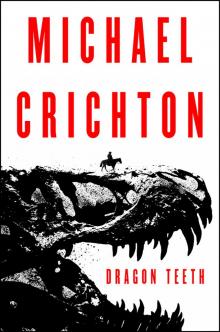 Dragon Teeth
Dragon Teeth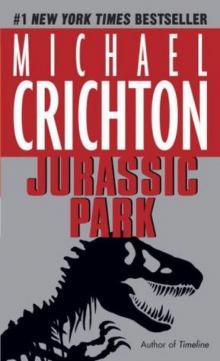 Jurassic Park
Jurassic Park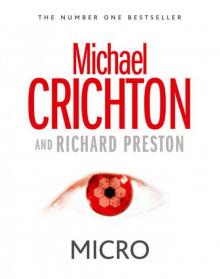 Micro
Micro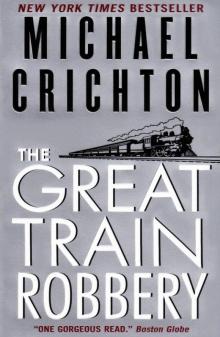 The Great Train Robbery
The Great Train Robbery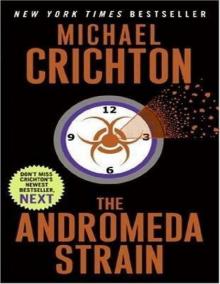 The Andromeda Strain
The Andromeda Strain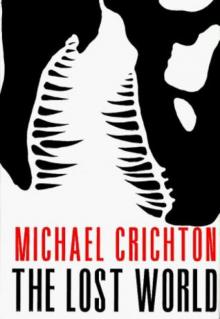 The Lost World
The Lost World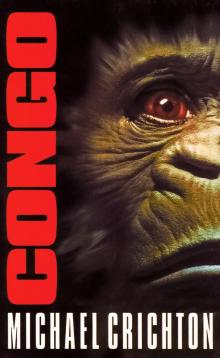 Congo
Congo Travels
Travels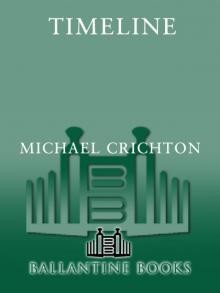 Timeline
Timeline Sphere
Sphere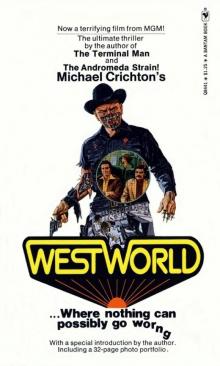 Westworld
Westworld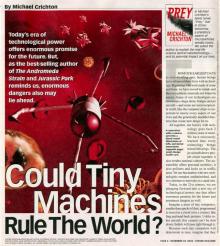 Prey
Prey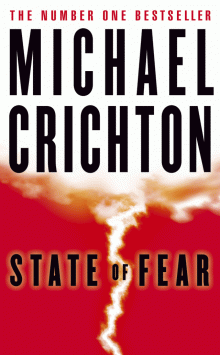 State Of Fear
State Of Fear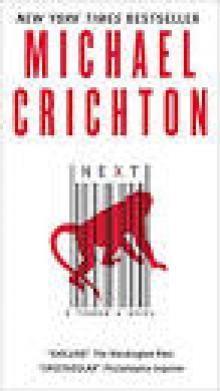 Next
Next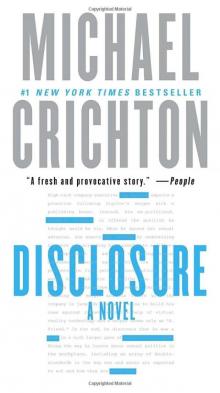 Disclosure
Disclosure Pirate Latitudes
Pirate Latitudes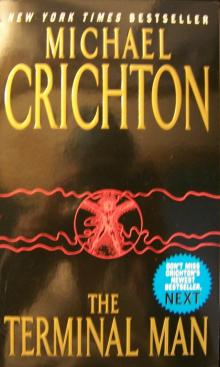 The Terminal Man
The Terminal Man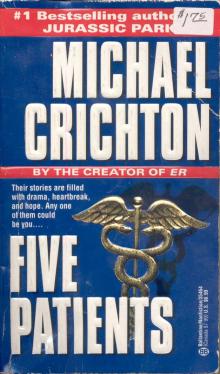 Five Patients
Five Patients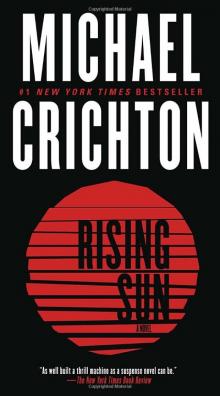 Rising Sun
Rising Sun Binary
Binary The Andromeda Evolution
The Andromeda Evolution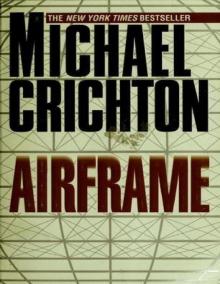 Airframe
Airframe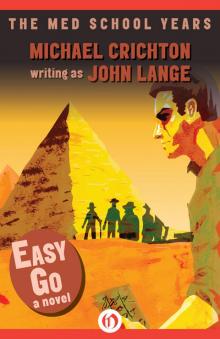 Easy Go
Easy Go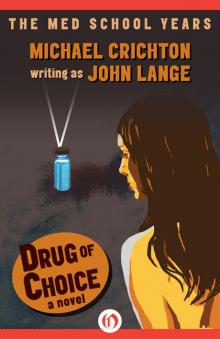 Drug of Choice
Drug of Choice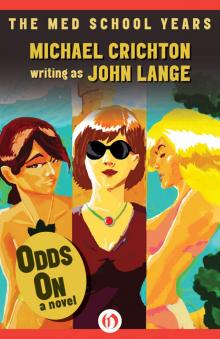 Odds On: A Novel
Odds On: A Novel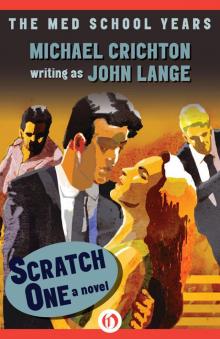 Scratch One
Scratch One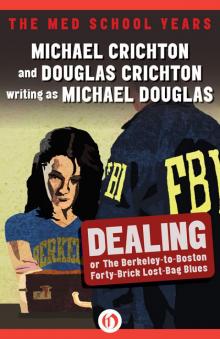 Dealing or The Berkeley-to-Boston Forty-Brick Lost-Bag Blues
Dealing or The Berkeley-to-Boston Forty-Brick Lost-Bag Blues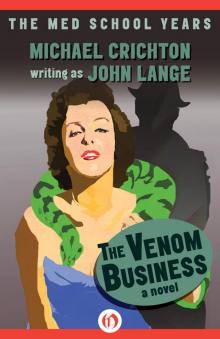 Venom Business
Venom Business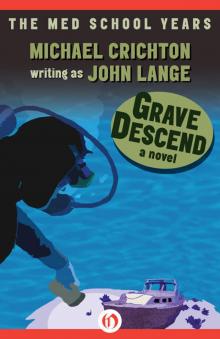 Grave Descend
Grave Descend Gold - Pirate Latitudes
Gold - Pirate Latitudes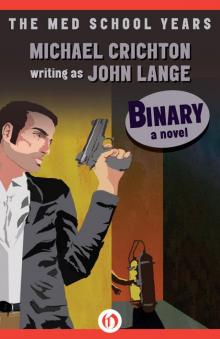 Binary: A Novel
Binary: A Novel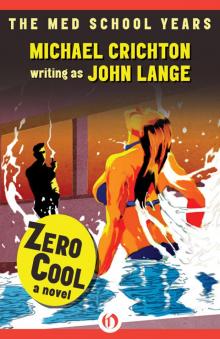 Zero Cool
Zero Cool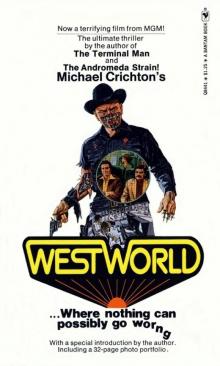 Delos 1 - Westworld
Delos 1 - Westworld